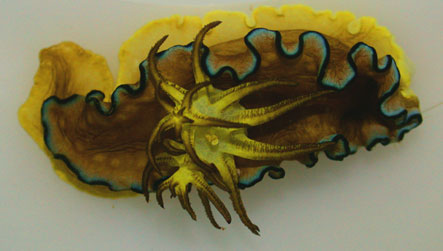NOWRAMP
2002
Creature
Feature - Mystery Sea Slug
Help us identify it!
Posted by Mark Heckman, Expedition Educator
Part
of the excitement of an expedition is the possibility of
finding things that are new or unknown. Certainly we achieve
this on a personal level every day. No matter how expert
a crew is, there is always something that we do not know.
As a result, small collections and many photographs are
taken in the field. These help to verify identifications
of animal life later, when we can share our results with
others in the field.

In
this case, we have a nudibranch, a type of sea slug; that
we have not seen before. With a limited library on our ship,
we can't figure out what it is. Want to take a shot and
try to identify it? Do some seaching for sea slug or nudibranch
resources on the web. You will be amazed at what you can
find. Take a close look at the picture. The patterns and
body parts have to match almost exactly with whatever you
find on the web. Note the double layer on the gills (the
feather like plume on the back of the animal), this is what
caught our eye.
If
you come up with an answer,
let us know!
- but it may not
be easy. And a mystery is half the fun.
The
specimen pictured was found in the lagoon of French
Frigate Shoals.
 Talk About It!
Talk About It!
What is that Mystery Slug?
Asked by Mary from Waikiki Acquarium on Sep 18, 2002.
Hey Mark,
Your nudibranch may be in the genus glosodoris. I found some similar ones in that genus on the web. The site says, "interesting about this species that as they get larger, the circle (or horse-shoe) of gills extends at each end into a secondary spiral so greatly increasing the number of gills." He has a lot of photos of glossodoris atromarginata (Including the only photo of one from Hawaii) The body shape and gills looks similar but it is lighter colored than your speciman. Maybe you got a new one there. The site is http://www.seaslugforum.net/glosatro.htm [beautiful image! -- Editor]
Your overworked cohort,
Mary Pickett
Another note from Mary:
Hey Mark,
There seems to be a lot of color variation in glossodoris atromarginata. Some of the other photos on the site are closer to the color of your little critter.
Mary
Answered by Mark Heckman from Waikiki Aquarium on Sep 19, 2002.
Thanks!